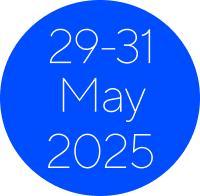Chair: Nathan Hutting (Netherlands)
Speakers: Riikka Holopainen (Finland), Adesola Odole (Nigeria), Mulugeta Chala (Canada)
- Attendees are aware of the importance of self-management support and the challenges faced in musculoskeletal physiotherapy practice (including challenges in low- and middle income countries and patients with limited health literacy).
- Attendees are able to describe characteristics, components and examples of self-management support and to apply this in different settings.
- Attendees are able to apply important components of person-centred self-management support in musculoskeletal physiotherapy practice, including in low resource settings.
Musculoskeletal conditions are ranked as the primary source of disability worldwide and the global burden of disability attributable to musculoskeletal conditions is expected to rise over the next decades, especially in low- and middle income countries (LMICs).
Self-management is considered the cornerstone of person-centred care and focusses on the knowledge and skills people need to take an active and responsible role to manage their condition and function optimally. Guidelines for treating people with musculoskeletal conditions call for care to be person-centred, with a focus on supporting effective self-management. Recent publications also emphasized the importance of providing person-centred care and self-management support in manual and musculoskeletal therapy. However, self-management is often perceived by clinicians as challenging and research suggests that physiotherapists often lack the knowledge and skills needed to fully integrate self-management support in clinical practice.
Self-management can also be challenging for patients, especially for those with limited health literacy as they experience added difficulties and barriers and low health literacy has been associated with poor self-management abilities. Moreover, implementation of patient-centred care and self-management support remains a challenge, especially among ethnic minorities and in LMICs.
This clinical seminar will support physiotherapists who provide care for people with musculoskeletal conditions in both understanding and overcoming barriers regarding providing self-management support. This seminar will start with a case study of a person with persistent and disabling pain. This case will then be discussed in four linked presentations. In every presentation specific (personal or contextual) information will be added to the case, leading to an attractive and thorough discussion from different perspectives. These will include perspectives from cognitive functional therapy as a patient-centred approach to facilitate self-management, providing self-management support in a person-centred manual therapy approach, self-management interventions for patients with musculoskeletal conditions and limited health literacy and self-management support in LMICs.
Session delivered by: International Federation of Manual and Musculoskeletal Physical Therapists
Hutting N. Supported self-management in musculoskeletal physiotherapy: the time is now! 2024. European Journal of Physiotherapy, 1–3.
Kent P, Haines T, O’Sullivan P, Smith A, Campbell A, Schutze R, Attwell S, Caneiro JP, Laird R, O’Sullivan K, McGregor A, Hartvigsen J, Lee DA, Vickery A, Hancock M; RESTORE trial team. Cognitive functional therapy with or without movement sensor biofeedback versus usual care for chronic, disabling low back pain (RESTORE): a randomised, controlled, three-arm, parallel group, phase 3, clinical trial. Lancet. 2023 Jun 3;401(10391):1866-1877.
Healey EL, Lewis M, Corp N, Shivji NA, van der Windt DA, Babatunde OO, Simkins J, Bartlam B, Rowlands G, Protheroe J. Supported self-management for all with musculoskeletal pain: an inclusive approach to intervention development: the EASIER study. BMC Musculoskelet Disord. 2023 Jun 10;24(1):474.
Hutting N, Caneiro JP, Ong’wen OM, Miciak M, Roberts L. Person-centered care for musculoskeletal pain: Putting principles into practice. Musculoskelet Sci Pract. 2022 Dec;62:102663.
Chala MB, Miller J, Ghahari S, Wondie Y, Abebe A, Donnelly C. Health care providers’ understanding of self-management support for people with chronic low back pain in Ethiopia: an interpretive description. BMC Health Serv Res. 2022 Feb14;22(1):194.
Hutting N, Caneiro JP, Ong’wen OM, Miciak M, Roberts L. Patient-centered care in musculoskeletal practice: Key elements to support clinicians to focus on the person. Musculoskelet Sci Pract. 2022 Feb;57:102434.
Sam S, Sharma R, Corp N, Igwesi-Chidobe C, Babatunde OO. Shared decision making in musculoskeletal pain consultations in low- and middle-income countries: a systematic review. Int Health. 2020 Sep1;12(5):455-471.
Hutting N, Oswald W, Staal JB, Heerkens YF. Self-management support for people with non-specific low back pain: A qualitative survey among physiotherapists and exercise therapists. Musculoskelet Sci Pract. 2020 Dec;50:102269.
Kerry R, Young KJ, Evans DW, Lee E, Georgopoulos V, Meakins A, McCarthy C, Cook C, Ridehalgh C, Vogel S, Banton A, Bergström C, Mazzieri AM, Mourad F, Hutting N. A modern way to teach and practice manual therapy. Chiropr Man Therap. 2024 May 21;32(1):17.
Keter D, Hutting N, Vogsland R, Cook C. JOSPT Open 2024;2(1):60-70. Epub 13 November 2023. doi:10.2519/josptopen.2023.0812
See the 11 clinical seminars to be presented at congress.
Find out who the key speakers at congress will be.
View the registration fees and register for congress.




